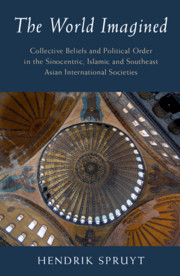
-
Select format
-
- Publisher:
- Cambridge University Press
- Publication date:
- 18 June 2020
- 02 July 2020
- ISBN:
- 9781108867948
- 9781108491211
- 9781108811743
- Dimensions:
- (228 x 152 mm)
- Weight & Pages:
- 0.69kg, 410 Pages
- Dimensions:
- (228 x 152 mm)
- Weight & Pages:
- 0.58kg, 410 Pages
Book description
Taking an inter-disciplinary approach, Spruyt explains the political organization of three non-European international societies from early modernity to the late nineteenth century. The Ottoman, Safavid and Mughal empires; the Sinocentric tributary system; and the Southeast Asian galactic empires, all which differed in key respects from the modern Westphalian state system. In each of these societies, collective beliefs were critical in structuring domestic orders and relations with other polities. These multi-ethnic empires allowed for greater accommodation and heterogeneity in comparison to the homogeneity that is demanded by the modern nation-state. Furthermore, Spruyt examines the encounter between these non-European systems and the West. Contrary to unidirectional descriptions of the encounter, these non-Westphalian polities creatively adapted to Western principles of organization and international conduct. By illuminating the encounter of the West and these Eurasian polities, this book serves to question the popular wisdom of modernity, wherein the Western nation-state is perceived as the desired norm, to be replicated in other polities.
Awards
Co-winner, 2021 J. David Greenstone Book Prize, American Political Science Association
Co-winner, 2021 ENMISA Distinguished Book Award, International Studies Association
Choice Outstanding Academic Title, 2021, Choice Reviews
Reviews
'The World Imagined is a path-breaking book of immense stature. It opens with a highly sophisticated tour d’horizon of the fields of anthropology, history, IR and sociology. Through this inter-discipliary dialogue, Spruyt builds a persuasive case for why we need a deeply interpretive approach to understanding historic international societies. He then provides the pay-off with three detailed studies of non-western international societies (East Asian tributary system; Southeast Asian kingdoms; Islamic empires): in each case, shared beliefs about authority and legitimacy defined the membership of the society and inscribed its boundaries. A worthy successor to Spruyt’s earlier, and equally brilliant book, The Sovereign State and its Competitors.'
Tim Dunne - Professor of International Relations and Pro-Vice-Chancellor, The University of Queensland
'This incredibly refreshing and original book is a bold piece of big thinking about international politics across time and space. Going back to first principles, it sheds the parochial and anachronistic Eurocentrism that has warped and restricted our understanding of international relations. Instead, Spruyt reveals how the way various universalistic Asian empires thought about themselves and others constituted a rich and fascinating variety of previously unknown international societies.'
Jason Sharman - Sir Patrick Sheehy Professor of International Relations, University of Cambridge
'With characteristic breadth and boldness, Spruyt makes creative use of the English School’s international society framing to take us outside IR’s theoretical comfort zone of Westphalian territorial sovereignty assumptions about world order. He opens new ground in comparing international societies across history, and uses this to lay foundations for a more global approach to the study of international relations.'
Barry Buzan - Professor Emeritus, London School of Economics and Political Science
'Skillfully defying the empiricist and presentist orthodoxies that rule over much of the social sciences today, Hendrik Spruyt demonstrates the importance of investigating across time, space, and academic disciplines. Spruyt’s critique of the European notions of international relations, and the comprehensive alternative he proposes, invites scholars and readers into a candid discussion of the origins, as well as the prospects, of our global order.'
Kaya Şahin - Associate Professor, Department of History, Indiana University
'Spruyt explores collective beliefs as the basis of political order in three historically significant contexts with differing power structures: the civilizational complexes of the Islamic world, the East Asian tributary system, and the Southeast Asian galactic empires. His rich analysis significantly advances our knowledge about non-European international societies, while his findings about the marked heterogeneity of the evolutionary encounters between these civilizations and European Westphalianism and colonialism push beyond existing English School and constructivist understandings of how global international society developed. This book provides an urgent corrective to the flawed expectation of ultimate convergence with an idealized Western state model. In an era of ‘Westlessness’, it is essential reading for all scholars of international relations.'
Evelyn Goh - Shedden Profesor of Strategic Policy Studies, Australian National University
'This book is a major tour de force. The interdisciplinary approach delighted me, the insightful study of different polities within a new comprehensive framework inspired me. Spruyt's approach is timely for political science to take seriously and gratifying to see.'
Karen Barkey - Haas Distinguished Chair of Religious Diversity, and Professor, Department of Sociology, University of California, Berkeley
‘Taking the necessary interdisciplinary tract to explore the Safavid, Mughal, and Ottoman empires in relation to their Southeast Asian counterparts and the Sinocentric tributary system dominating parts of Asia, this book offers an invaluable contrastive register of global history … Offering readers a rich, distinctive approach to accounting for how non-European systems functioned in relation to engagements with the West …’
I. Blumi Source: Choice
‘… this book offers a distinctive perspective on the variety of historical international orders. It challenges conventional modernist accounts of the 'expansion' of the Western 'international society' and the 'formation' of the modern international system.’
Zheng Chen Source: China International Strategy Review
Contents
Metrics
Altmetric attention score
Full text views
Full text views help Loading metrics...
Loading metrics...
* Views captured on Cambridge Core between #date#. This data will be updated every 24 hours.
Usage data cannot currently be displayed.
Accessibility standard: Unknown
Why this information is here
This section outlines the accessibility features of this content - including support for screen readers, full keyboard navigation and high-contrast display options. This may not be relevant for you.
Accessibility Information
Accessibility compliance for the PDF of this book is currently unknown and may be updated in the future.


